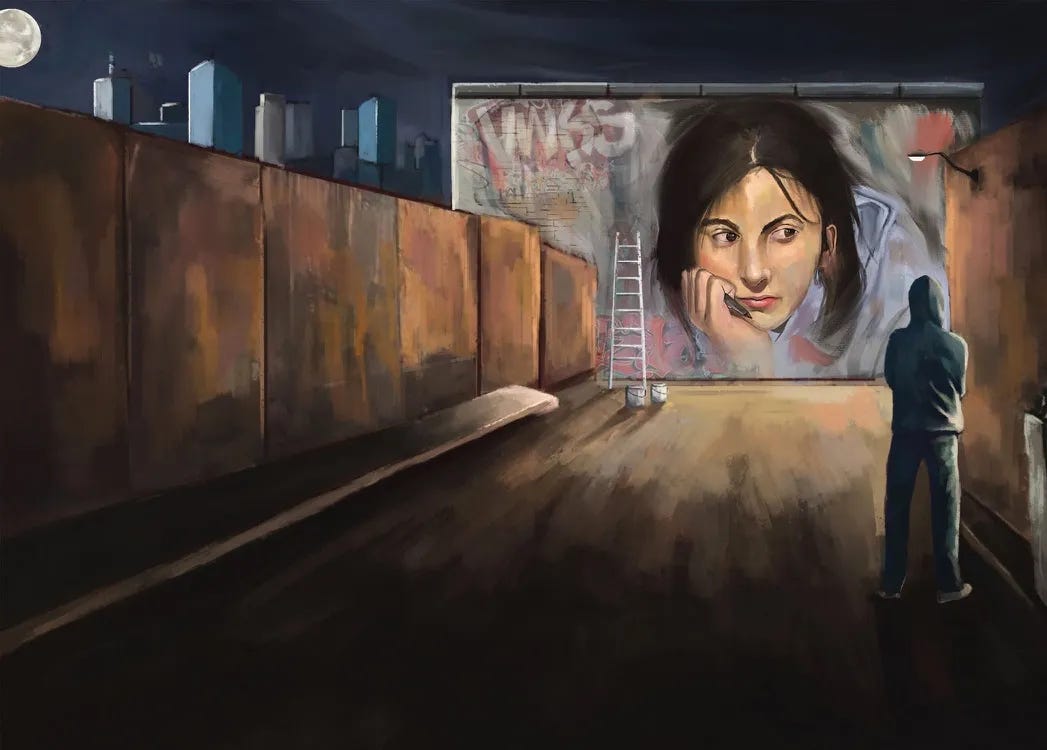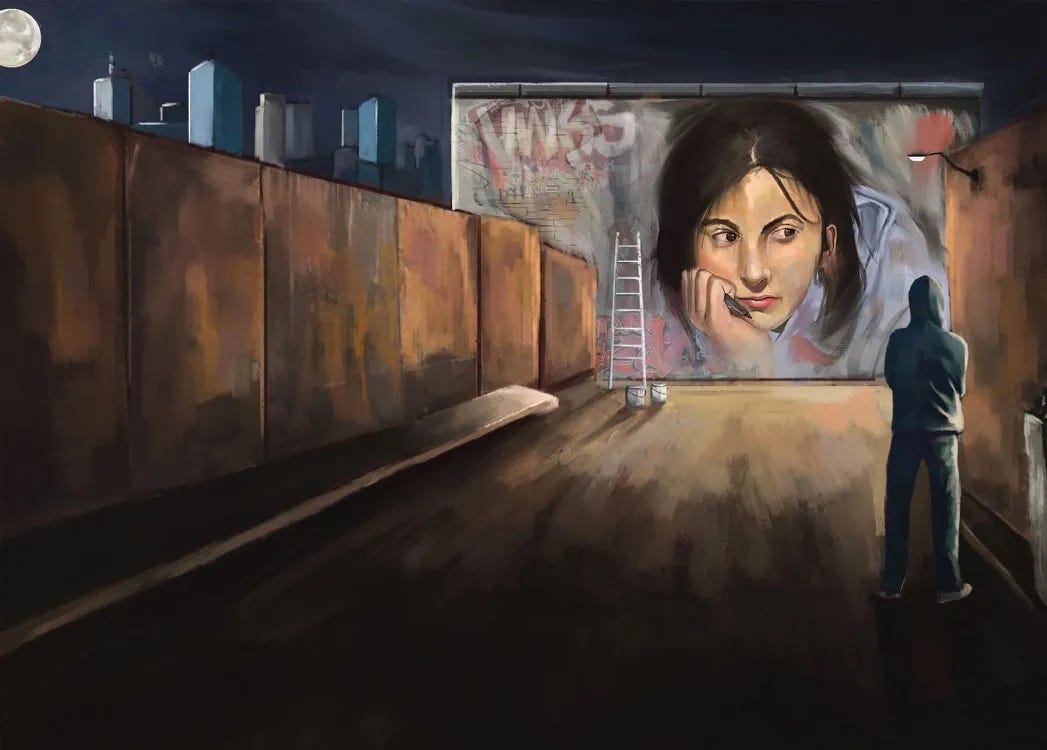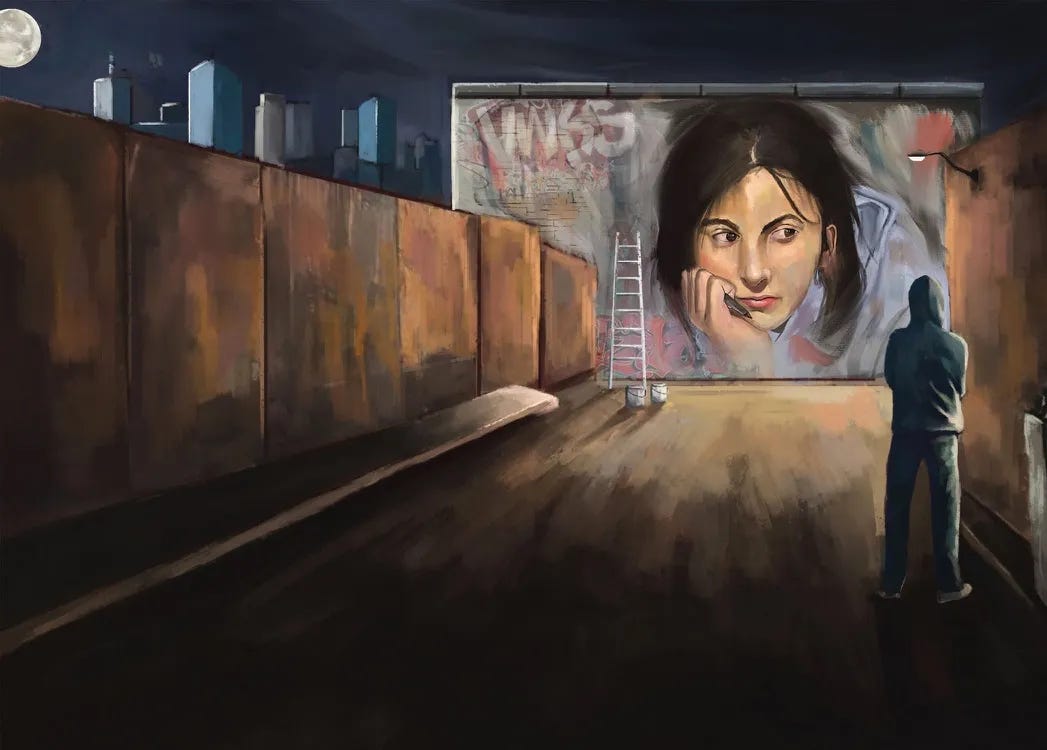
Max fiddles with the spoon that sits in his now empty coffee cup. He is sitting alone at the kitchen bench. Harriet has just stormed out. After the shouting and the slammed door, the house is silent.
He’d woken up out of sorts. Did he have some kind of nightmare? He can’t remember, though the state of his bedclothes told him it had been a restless night. The sight of Spinoza’s Ethics by his bedside had added to the irritation. It is a book he wants to understand, a book he’s tried to get his head around several times, but again last night its odd collection of pithy proofs and demonstrations wore him down. It seems that his brain isn’t up to it. Or so it seemed last night. In retrospect, the email he’d written to Molly about Spinoza now seems pretentious, fraudulent.
And then the argument with Harriet. Now that she’s gone, he wonders if it had all been his fault, a consequence of his ill-humour.
She is growing up and slipping away.
He sensed, as soon as he walked into the kitchen, that something was up. Harriet was there before him. She was awake and dressed. He couldn’t remember that ever happening before on a Saturday morning.
‘What’s this?’ he’d said.
‘I couldn’t sleep,’ she said.
‘Still worried about Zeph?’ Max could feel himself trying to keep the edge out of his voice, to calm the inner discord.
‘Mmm,’ she mumbled.
So she didn’t want to talk.
He poured himself some muesli. ‘Want some?’ he asked.
She was restless. Earlier in the week she was without energy. The edginess was new.
‘I’m not really hungry,’ she said. Then he noticed that there was a washed frying pan in the sink and toast crumbs on the bench. Was that fried egg he could smell? Not her usual breakfast. Harriet had been watching him and said suddenly, ‘I’ve already eaten. I’m going to have a shower.’
There was definitely something up, he thought. This isn’t just my mood. While Harriet was in the shower, he looked through the open door of her bedroom and noticed that her bed was made. When did Harriet ever make her bed?
‘Are you OK Harriet?’ he asked when she reappeared. ‘What’s up honey?’
‘Grandpa, if someone’s in need, it’s right to try to help them, isn’t it.’
‘Of course,’ he said. Where was this leading?
‘Would you help me to help Zeph?’ She said it almost as a challenge.
‘What do you mean?’
‘If he was in trouble, if he needed our help, would you let me give it to him?’
‘What’s going on Harriet?’
‘If he had nowhere to go, could he stay with us?’
‘How can I answer that?’ he said. ‘I’ve never met the boy.’
‘But if he needed somewhere to stay …?’
Max looked again at the frypan.
‘Has he been round here this morning?’
Silence.
‘You should have checked with me first.’
And suddenly she was shouting. ‘You’re so full of it,’ she yelled. ‘You talk about your myths and folktales telling us how to live, how to behave when our comfortable lives might be upset. But then you refuse to help a boy who really needs our help.’
‘Harriet, come on, I was simply asking you if he’d been here this morning.’
‘You were being critical, you don’t want your world to be upset and it’s not right.’
And then, most uncharacteristically, Harriet had burst into tears and run out of the house. She had slammed the door. He hadn’t seen her since.
He stirs his cold coffee. He feels his sanctuary sullied by this unknown presence. Does this disturbed boy have some kind of a hold over his grand-daughter? These are unpleasant thoughts and unworthy feelings. He would like to be better than this.
It’s late morning. Debris from last night’s storm is scattered around the deserted primary school playground. Zeph is sitting on a low brick wall next to the swings. He has his face turned up towards the sun, like a lizard soaking up the warmth.
He’s wearing the same jeans, hoody, the same sneakers, as he was wearing last night, but now at least they’re dry.
Harriet is sitting on the swing next to him. She is wearing jeans, a white sweatshirt and sneakers. He hasn’t seen her out of school uniform before, except of course for last night. She looks different. Less bookish or something. Still really pretty though.
She’s brought sandwiches from a shop, but he’s not all that hungry. Just enjoying the sun. Swinging gently and soaking up the sun.
She keeps asking questions. About the last week. It’s hard to know what to say. He wants to talk to her. But the words won’t come. As usual.
He thinks back over the past week. Nights awake in the abandoned warehouse. Sleeping during the day, in the city, under the bridge when it was wet, in patches of sun when the sun was out. But always in the warehouse at night. First of all just worrying. Trying unsuccessfully to think of a plan.
Then painting.
Painting was a relief. When he was painting, it was like he was in a different world. One where he was in control, sort of. Especially with this painting.
Harriet has stopped asking questions. She’s looking off into the distance, taking tiny bites of a sandwich. He hopes she’s not angry. He wants to talk to her. He just can’t think of what to say. Or how to describe this last week.
Walking or sleeping during the day, trying to keep warm. Or just riding on a train, round and round the city loop, until the commuters started to climb on board and he’d be conscious of the way they stared at him. Or scowled. He knew he probably smelled. He didn’t smell it himself. But he could see it from the way people reacted.
Then back to the warehouse at night. Painting on the blank canvas, the ground floor wall. Sometimes with spray cans, sometimes with his brushes. Painting a big door. He had to stretch to reach the top. But it has turned out well. Just like he imagined it.
He’s worked on it every night. It’s sort of got hold of him, this painting. It’s been like an obsession, like he’d stop existing or something if he stopped painting it.
Zeph wants to take Harriet to see the painting, to see the door he has created.
He looks at her. She looks so sad. Worried. He doesn’t want her to be worried. He wants to show her the painting. It will make her feel happy. It makes him feel good just to think about it.
‘I want to show you something,’ he says.
‘You said that once before,’ she says. But now she’s smiling. He smiles back. It’s a relief, seeing her smile.
‘It’s in the warehouse. I want to show you.’
‘What warehouse?’
He describes where the warehouse is.
‘What do you want to show me?’
‘Something I did.’
‘Another painting?’
He nods.
‘I can’t. Not now. I’m going to see Ms McInness. Later though? About 5?’
The battery in his phone is flat. But there’s a big clock at the city hall not far away from the warehouse. He nods.
‘Are you OK Zeph? You haven’t eaten much.’
He nods. He’s pleased that she’s concerned.
‘You look better than you did last night,’ she says. ‘You looked like a drowned rat last night.’
He nods again.
‘You’re OK? Really?’
‘I’ll see you at 5,’ he says. ‘At the warehouse.’
She nods. ‘OK, see you then.’
There’s a knock at the door. Molly can see through the window that it’s Harriet. What’s she doing here? How does she know the address? Harriet is looking agitated, lips clenched, running a hand through her thick black hair. She knocks again before Molly gets to the door.
‘Hi Harriet,’ she says.
‘Hi Ms McInness. I’m sorry to disturb you at home, but can I talk to you about something?’
‘Of course. Are you OK?’
‘I’ve seen him. Zeph. I’ve seen Zeph.’
Molly notices the red eyes. ‘You’ve seen Zeph? Where?’
‘He stayed at my place last night,’ she says. Then the tears come.
Molly takes her through to her sitting room and they sit together on the green velvet couch. It’s the darkest room, with no windows to the outside, and Molly senses Harriet relaxing into this womb-like cosiness.
‘Is he OK?’
‘Sort of.’
‘Are you?’
Harriet looks up and Molly sees new tears forming.
‘Not really. I haven’t slept much. Zeph is a mess. And I ended up shouting at Grandpa.’ Harriet reaches into a shopping bag, then hands her journal to Molly. ‘But I’ve been writing.’ She forces out a half-smile. ‘I’ve been writing about what’s happened. Where I’ve put the bookmark. I’d like you to read it.
Molly reads Harriet’s account of last night. She can feel Harriet’s anxious eyes on her.
‘You write well Harriet,’ she says. ‘In the midst of all this turmoil, you still write well.’
‘I can make things sound clear when I’m writing about them. But that’s not always the way it feels. It’s much more muddled in the moment.’
‘More complicated.’
‘I feel really confused at the moment. With Grandpa too. I guess I want Grandpa to fix the mess. I needed him to say of course Zeph could stay with us. I got angry when he didn’t agree straight away. I know I was being unreasonable. I just feel so stressed.’
‘How can I help?’
Harriet shrugs her shoulders.
‘You know where Zeph is?’
‘We’re meeting later today.’
‘You can tell him that he can stay here for a while,’ Molly says. Is this crossing some line, she wonders? But the boy is in trouble.
‘The police will be looking for him maybe,’ says Harriet.
‘He needs a place to stay. Well anyway, tell him the offer is there.’
‘You won’t tell anyone, will you?’
‘Not unless I think he’s in danger.’
‘I don’t want him to think I’ve betrayed him or anything.’
‘I won’t tell anyone unless I think he’s in danger,’ Molly says again. ‘And the offer is there. He can eat here. Or sleep here. There’s plenty of room.’
Molly has had the fire on, even though it’s sunny outside. The room gets none of the winter sun’s warmth. She can see Harriet watching the flames.
‘Do you want something to eat?’ Molly says.
‘I’m not hungry, but thanks.’
They sit quietly for a while.
‘Ms McInness?’
‘Mmm.’
‘Can I see that ruby brooch again?’
‘Sure.’
Molly fetches it from her bedroom. When she returns, Harriet is sitting on the carpet leaning towards the fire. Molly passes her the brooch.
She watches as Harriet holds the brooch in her cupped hands, holds it up to the light, all the while staring intently into it, and then rubbing it against her cheek and touching it with her lips. A fragment from a Rilke poem come to Molly as she watches. Things are violin bodies filled with murmuring darkness.
‘I had a dream about this brooch,’ says Harriet. ‘Just a few nights ago.’
‘Goodness! You dreamt about my brooch? What happened in the dream?’
‘I don’t really remember. Just that I was holding it and that I got this most amazing feeling. Like joy.’
‘And what are you feeling now as you hold it?’
Harriet shakes her head and smiles. ‘It’s beautiful. It’s kind of magic. I don’t know. I just feel a bit more calm.’
It was 5pm, an hour or so after I left Ms McInness’s house and nursed that wonderful ruby brooch. As I approached the warehouse, I could see Zeph standing at the window, waiting.
He hurried outside as soon as he saw me, shielding his eyes against the winter sun. He had fresh paint on his clothes, the clothes I dried last night. He looked pleased to see me.
‘Hi Harriet,’ he said brightly.
This was weird. The mood was so much lighter than earlier at the swings. He was almost chirpy.
‘Come on,’ he said.
And then I got a real surprise. He took my hand in his.
He led the way into the warehouse. Then he let go of my hand and stood to one side, pointing to something on the wall opposite the doorway. It was surprisingly light in there. The sun on the western horizon was streaming in through a window. For a moment I couldn’t make out what he was wanting me to see.
Then the world stood still. I couldn’t speak.
‘What do you think?’ Zeph said proudly. ‘Not bad, eh.’
There, in front of me, was a painting of an old stone wall. It looked so unbelievably real. I wanted to run my hand along and feel the cold stone, feel all its grooves and grit. There was ivy on the wall, a dark green ivy, and somehow (how do you do this with paint?) Zeph has created ivy that seemed to cast little shadows, that would harbour tiny insects. As I stared at it, my mouth no doubt daggishly open, I swear I could see the ivy rustling in the breeze.
And there was a door in the wall, a great thick wooden door with a big iron handle. The wood was weathered and knotted. There were splinters. The detail was stunning.
The door was a little ajar, revealing a glimpse of a world on the other side of the wall. There were rocks there, and the hint of a shoreline. There was a wave crashing over the rocks. I imagined I could hear the boom of the surf.
‘Not bad, eh,’ says Zeph.
I was speechless. I could hardly breathe. It was just the most amazing thing I’d ever seen. Absolutely fucking fantastic.
Then, suddenly, as clear as a bell, I knew exactly what I was going to do.






